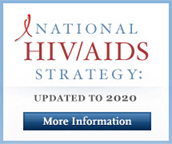Everyone depends on health care products and services to stay well and live, work, and participate in our communities, and research suggests that there is a reciprocal relationship between employment and health. However, for many Americans with disabilities, access to adequate and affordable health care coverage and services are significant obstacles to independent living, employment, and full inclusion in society. Thus, ODEP actively seeks to integrate health care issues across its employment policy efforts.
The following provide more information about health care and its connection to disability employment and the work ODEP and its partners are undertaking in this area:
- Employment and HIV/AIDS — DOL is one of six federal agencies responsible for implementing the National HIV/AIDS Strategy for the United States. ODEP plays a key role in DOL's efforts to carry out the Strategy, focusing in particular on improving employment opportunities and outcomes and reducing stigma and discrimination against people living with HIV/AIDS.
- Getting to Work: A Training Curriculum for HIV/AIDS Service Providers and Housing Providers — Developed collaboratively by ODEP and the Department of Housing and Urban Development's Housing Opportunities for Persons with AIDS (HOPWA) agency, Getting to Work is an interactive multi-media curriculum that seeks to assist HIV/AIDS service providers in understanding how employment can add value for individuals, families, and communities.

- Health Care and Youth Transitions — As youth transition from secondary education to post-secondary education and employment, many are also transitioning from pediatric health care to adult health care settings. Youth with disabilities may face unique challenges during these transitions. ODEP and its partners examine the challenges that youth, including youth with disabilities, encounter and seek to provide tools and resources that facilitate successful transitions.
- Youth Transitions Collaborative/The Center for Health Care Transition Improvement Alliance — In conjunction with its alliance partners, ODEP seeks to provide stakeholders with information, technical assistance, and access to resources to build the capacity of regional and national organizations to empower youth and young adults with disabilities to create a self-directed path to integrated employment and optimal health and well-being.
- Health Care Transition Quick Guide (PDF) (2015)
- “Dear Colleague” Letter Introducing the Quick Guide (PDF) (2015)
- Youth Transitions Collaborative/The Center for Health Care Transition Improvement Alliance Final Report (PDF) (2016)
-
Youth ACT Rhode Island Project — As participants in the national Youth Action Council on Transition (YouthACT), a team of youth-adult partners in Rhode Island works to bring the youth voice of their state into disability awareness and civil rights. One important piece of this goal is to ensure that youth with disabilities develop their understanding of healthcare transition, which the team promotes through planning and contributing to workshops at the annual Dare to Dream Leadership Conference. Their work also includes presentations and collaboration with students, teachers, nonprofits, transition academies, and the Rhode Island Department of Health.

RI YouthACT Team Members Pauline Thompson, Kathy Kuiper, and Bethany Boucher
- Webinar: The Rhode Island Youth ACT Team discusses the Health Care Transition Quick Guide (10/13/2015)
- Policy Brief: Health Transitions — A Pathway to Employment for Youth with Chronic Health Conditions and Other Disabilities (PDF) (2013)
- Policy Brief: Transition's Missing Link — Health Care Transition (2012)
- Youth Transitions Collaborative/The Center for Health Care Transition Improvement Alliance — In conjunction with its alliance partners, ODEP seeks to provide stakeholders with information, technical assistance, and access to resources to build the capacity of regional and national organizations to empower youth and young adults with disabilities to create a self-directed path to integrated employment and optimal health and well-being.
- National Organization of Nurses with Disabilities (NOND) Alliance — ODEP and NOND partnered to conduct outreach, education, and technical assistance activities to promote the recruitment, hiring, retention, and advancement of individuals with disabilities in the health care sector.
Additional Federal Resources on Health Care
- NCD Principles for Public and Private Health Care Reform — National Council on Disability (NCD) recommendations for all proposed legislative changes to healthcare, including Medicaid. Access to quality health care and home- and community-based services is central to promoting independent living among people with disabilities.
- What Health Care Professionals Can Do to Be Accessible (PDF) — This fact sheet from the Centers for Disease Control and Prevention (CDC) describes the importance of understanding the laws and regulations that protect the rights of individuals with disabilities, such as assuring that health care facilities and medical equipment are accessible.
